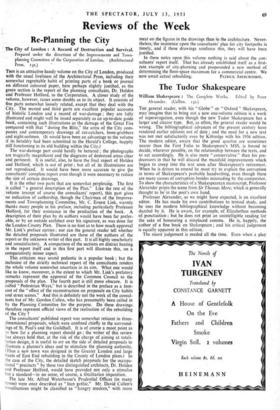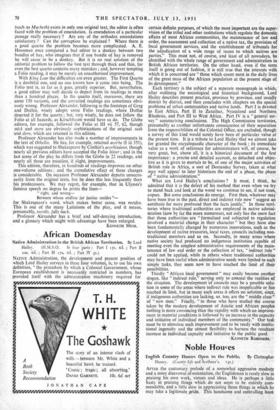The Tudor Shakespeare
William Shakespeare : The Complete Works. Edited by Peter
Alexander. (Collins. t Es.) The general reader, with his " Globe " or " Oxford " Shakespeare, may'imagine that to bring out a new one-volume edition is a work of supererogation, even though the new Tudor Shakespeare has a larger and clearer type. But, as often, the general reader would be wrong. The bibliographical advances of the present century have rendered earlier editions out of date ; and the need for a new text was not met satisfactorily even by Kittredge with his 1936 edition. The modern editor, aware that the good quartos are sometimes nearer than the First Folio to Shakespeare's MSS, is bound to decide, wherever possible, on the relationship between the texts, and to -act accordingly. He is also more " conservative " than his pre- decessors in that he will discard the manifold improvements which began to creep into the text soon after Shakespeare's retirement. When he is driven to emend he must try to explain the corruption in terms of Shakespeare's probable handwriting, even though there are many causes of corruption besides misreading by the compositor. To show the characteristics of a Shakespearean manuscript, Professor Alexander prints the scene from Sir Thomas More, which is generally thought to be' in the poet's own hand.
Professor Alexander, as we might have expected, is an excellent editor. He has made his own contributions to textual study, and he uses the modern bibliographical knowledge without becoming dazzled by it. He is aware, for example, of Elizabethan methods of-punctuation ; but he does not print an unintelligible reading for the sake of honouring a misplaced comma. He is, happily, the author of a fine book on Shakespeare ; and his critical judgement is equally apparent in this edition.
The nicest judgement is needed all the time. Even when a play (such as Macbeth) exists in only one original text, the editor is often faced with the problem of emendation. Is emendation of a particular passage really necessary ? Are any of the orthodox emendations satisfactory ? Can the corruption be explained ? Where there, is a good quarto the problem becomes more complicated. A. E. Housman once compared a bad editor to a donkey between two bundles of hay, who imagines that if one bundle of hay is removed he will cease to be a donkey. But it is no real solution of the editorial problem to follow the best text through thick and thin, for even the best quarto contains many mistakes ; and, however tempting a Folio reading, it may be merely an unauthorised improvement.
With King Lear the difficulties are even greater. The First Quarto is a doubtful one, and no one knows how it came into being. The Folio text is, as far as it goes, greatly superior. But, nevertheless, a good editor may well decide to depart from its readings in more than a hundred places. In the quarto itself, moreover, there are some 150 variants, and the corrected readings are sometimes obvi- ously wrong. Professor Alexander, following in the footsteps of Greg and Duthie, wisely adopts some Folio readings, where Duthie deserted it for the quarto ; but, very wisely, he does not follow the Folio at all hazards, as Kirschbaum would have us do. The Globe editors, for example, followed the Folio, at III vii 57, 62, though stick and stern are obviously sophistications of the original rash and dern, 'which are retained in this edition.
Professor Alexander has also made a number of improvements in the text of Othello. He has, for example, retained acerbe (I iii 351), .which was suggested to Shakespeare by Cinthio's acerbissimo, though nearly all previous editors have accepted the Folio bitter ; and in the last scene of the play he differs from the Globe in 22 readings, and nearly all these are manifest, if slight, improvements.
This edition, therefore, in hundreds of readings improves on other one-volume editions ; and the cumulative effect of these changes is considerable. On occasion Professor Alexander departs unneces- sarily from the original texts, but he does this Iess frequently than his predecessors. We may regret, for example, that in Ulysses's famous speech on degree he prints the lines-
" right, and wrong—
Between whose endless jar justice resides'— • for Shakespeare's word, which makes better sense, was recides. -This is one of the many Latinisms of the play, and it means, presumably, recoils, falls back.
Professor Alexander has a brief and self-denying introduction, and a glossary which might with advantage have been enlarged.
KENNETH MUIR.







































 Previous page
Previous page